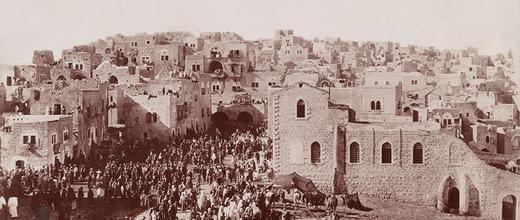The views expressed in our content reflect individual perspectives and do not represent the authoritative views of the Baha'i Faith.
Jesus Christ was famously born in Bethlehem; however, he was raised in Nazareth, a township with a negative reputation, according to the Gospel of St. John:
Can any good thing come out of Nazareth? – John 1:46.
Such notoriety may indicate that God chose such a birthplace for His divine messenger in order to demonstrate that the light of revelation can shine forth even from the darkest of regions.
In the same way, Shoghi Effendi, in his introduction to his translation of the early Babi and Baha’i history The Dawn Breakers, goes to great lengths to point out how 19th century Persia (Iran), the birthplace of the most recent divine messenger Baha’u’llah, was a backward nation, plagued by corrupt practices and vicious bigotries.
Some nations suffer from underdevelopment or poor resources, but 19th century Persia remained willfully stagnant. Its nationalistic and religious conceits had created a smug, grandiose sense of self-content among its rulers and clerics, along with a stubborn refusal to modernize. As a result, a pall of immobility lay over the land, while a paralysis of thought gripped Persians, high and low alike.
Most of Persia’s stagnation came from the attitudes and prejudices of the Shi’ite priesthood. This all-powerful and corrupt clergy held the average Persian in complete thrall from cradle to grave. Moreover, according to Shi’ite dogma, the non-believer was deemed unclean. Therefore, as a source of moral pollution, the non-Muslim had to be avoided at all costs. Western scientific and cultural advances, because they came from “infidel” Europe, were a contradiction in terms. At the time, Persia had no interest in non-believers’ railroads, steamboats and telegraph lines – or any “unclean” Western ideas, least of all democracy.
In his book The Secret of Divine Civilization, Abdu’l-Baha addressed his fellow Persians boldly, challenging them to move beyond these entrenched superstitions and prejudices:
O people of Persia! Awake from your drunken sleep! Rise up from your lethargy! Be fair in your judgment: will the dictates of honor permit this holy land, once the wellspring of world civilization, the source of glory and joy for all mankind, the envy of East and West, to remain an object of pity, deplored by all nations? She was once the noblest of peoples: will you let contemporary history register for the ages her now degenerate state? – p. 8.
Exacerbating this unfounded intellectual arrogance, Persia’s Shi’ite clergy exemplified a moral hypocrisy that even sanctioned sexual degeneracy. Shoghi Effendi pointed out the Shi’ite priesthood’s practice of sexual procurement—for a price. In pilgrim cities such as Mashhad, the clergy set up “houses of sale” where pilgrims could buy a wife for the night. The clerics would charge a fee for this temporary marriage to a “purchased bride.” After the client’s night of pleasure, the so-called Shiite holy men would charge a fee to divorce the prurient pilgrim from his temporary consort, as well as a fee for the upkeep of the unmade maiden – until she “wed” again. Elaborate “religious” laws (sharí’ah) legitimized all aspects of this disgraceful practice, characterized by Shoghi Effendi as “hardly distinguishable from quasi-prostitution.” – The Promised Day is Come, p. 93.
Such was Persia’s rot when the Bab and Baha’u’llah appeared and founded their new Faiths. Baha’u’llah addressed the Persians, advising them to “Let nothing grieve thee,” because:
… God hath chosen thee to be the source of the joy of all mankind … inasmuch as within thee was born the Manifestation of His Glory …. Erelong will the state of affairs within thee be changed and the reins of power fall into the hands of the people …. The day is approaching when thy agitation will have been transmuted into peace and quiet calm. – Baha’u’llah, Epistle to the Son of the Wolf, p. 149.
These stark contrasts between the culture a prophet of God appears in and the new holy message he brings highlight the ongoing human interplay between light and dark. But dawn must always overcome darkness. By portraying so vividly the particular details of Persia’s murky moral atmosphere, the Baha’i teachings seem to say that to truly appreciate the early Baha’is one must realize the darkness they broke through – not to get lost in it, but to be aware of the forces of darkness continually assailing us. Shoghi Effendi prescribed precisely how to wage a spiritual struggle against those forces:
Fully alive to the unfailing efficacy of the power of Baha’u’llah, and armed with the essential weapons of wise restraint and inflexible resolve, let [the believer] wage a constant fight against the inherited tendencies, the corruptive instincts, the fluctuating fashions, the false pretences of the society in which he lives and moves. – Baha’i Administration, p. 130.
Shoghi Effendi translated Nabil’s Narrative, that dramatic portrayal of the Faith’s nascent struggle between the forces of light and darkness, and titled it The Dawn Breakers. However, the style and format of that seminal text is not always accessible to everyone. In 1982, the National Spiritual Assembly of the Baha’is of the United States suggested a popular historical account be written about the early days of the Faith. Although trained as a playwright, very soon thereafter I began research to try my hand at writing such a book.
Almost four decades later, my new book Persian Passion has finally taken shape as a trilogy. This year the first volume has just been published to coincide with the bicentennial of the birth of the Bab. Its two main characters are the two chief antagonists of the Babi Revelation: the shah’s Grand Vizier (Prime Minister) and the shah’s unfaithful wife.
One wanted the Bab dead; the other wanted Baha’u’llah dead. Their shady dual machinations drive the villainous action in the foreground of the book, while in the wings the Bab and Baha’u’llah begin to cast the first rays of their world-illuminating light.
Persian Passion is not a work of fiction. All details in the book have been researched meticulously, and all characters and events, at least to the best of my ability, are historically accurate. However, readers will find it has the pace and plot of a novel that recounts the seminal events of 1848, which sent ripples of evolutionary change throughout the world.
In July of 1848, the Bab proclaimed himself the Promised One at a public tribunal. Baha’u’llah galvanized the early believers at the Conference of Badasht, where Tahirih removed her veil and declared the emancipation of women. The first follower of the Bab, Mulla Husayn, led a troop of mounted Babis under the banner of the Promised One toward the capital.
For the first-time, in a popular format, the chief antagonists of the Babi Revelation darkly highlight the Dawn-Breakers all the more brightly. Please follow along in this brief three-part series of essays for an introduction to this heroic, dramatic period in the early history of the Baha’i Faith.

















Comments
Sign in or create an account
Continue with Facebookor